Falling Down is something of a cult classic. It, along with Phone Booth, stands as proof that Joel Schumacher is actually a rather wonderful director, as much as his failures might occasional overshadow his accomplishments. Filmed in the midst of the Los Angeles riots, Falling Down manages to speak to a lot of the anger of urban living, as William “D-Fens” Foster takes out his frustration on an urban environment that has gone completely mad. Almost twenty years after it was originally released, Falling Down is still a potent little film.
Falling Down is a rather politically fascinating film, in that it likely offers an interesting reflection back at the viewer. It’s possible to look at the film and reach any number of conclusions. Foster himself is an interesting lead character, the man who had enough and who snapped. It is tempting to see him as an “everyman”, while the film is careful to not to make such suggestions. While it allows Foster to make several clever observations about the day-to-day realities of urban living, it’s hard to argue that Schumacher is ever completely sympathetic to Foster.
We’re told, early on, that his family is afraid of him – even before he snapped. “He has this horrendous temper,” his wife tells a police office, also noting he has “a propensity for violence.” When Detective Prendergast interviews Foster’s mother, she is quite visibly afraid of her son. She tells the police officer, “He looks at me like he’d try to kill me. Don’t tell him I said that.” Throughout the film, Foster is presented as somewhat irresponsible and misinformed. At one point he accidentally fires a sub-machine gun in a crowded restaurant, while at another he accidentally fires a rocket launcher. Dealing with a Korean shop-owner, he demands, “Do you have any idea how money my country has given your country?” When challenged, on it, he confesses, “I don’t know, but it’s gotta be a lot.” He mocks the owner’s accent.
The movie is essentially the story of Foster’s trip to his daughter’s birthday party, as fate conspires to keep him away. However, there are some rather sinister implications about what Foster plans to do when he gets home. At one point, on the phone, he asks his ex-wife, “Did you know, Beth, that in some South American countries it’s still legal to kill your wife if she insults you?” Talking to a little girl he meets on his travels, Foster explains his plans, “And then when it got dark, we’d all go to sleep together. We’d all sleep together in the dark. And everything would be just like it was before.” That seems quite sinister.
Later, he demands of his wife, “Does this ring a bell? ‘Till death do us part’? Do you remember that?” Even Prendergast calls him out on it when he claims he doesn’t know what’s going to happen next. “Guys like you always say that! You know exactly what you were gonna do. Kill your wife and child!” Looking back over family films, Foster sees that he wasn’t the honest-to-goodness father than he wanted to be. “I’m the bad guy?” he asks at one point, hurt and confused.
The movie is filled with people who are in a similar position to Foster. Most notably, even his victims – the gang members and the Neo-Nazi are arguably only acting out at a society they feel ignores them. “We’re the same, you and me, we’re the same,” the Nazi suggests. The gang members try to make their crappy living conditions better by asserting control over them through violence, just like Foster does. It seems like the entire city is on the verge of exploding, with a similarly-dressed “not economically viable” man protesting outside a bank in similarly outraged terms. Foster is, however, contrasted most effectively with Prendergast, the retiring police officer. Asked by Prendergast what Foster looked like, she tells the cop, “He looked like you.”
Prendergast sees all the same problems that Foster sees. He’s even trapped in the same traffic jam at the start of the film. He has the same bitter rants about how messed up the world is. “Would you believe it that I used to fish right here?” he remarks on the peer. “This very spot? Now they tell you, “Don’t eat the fish. It’s poisonous.” You can’t even swim in the water. It’ll give you some kind of bacterial infection.”It doesn’t seem too different from any of Foster’s rants, but the difference is, of course, that Prendergast holds it all together.
Of course, the fact that Foster is a psychopath doesn’t mean that his arguments don’t make sense. I think a lot of people have felt his rage at the modern world, even if they’d never act out like he did. His observations are wry, and quite clever. Confronting an employee working on a road, he sees a common racket in operation. “You see, I don’t think anything’s wrong with the street. I think you’re just trying to justify your inflated budgets! I know that if you don’t spend the projected amount this year, you don’t get the same amount next year!” As he wonders about the wealth that plastic surgeons earn, it’s hard not to concede that he might have a point about how broken society can be.
I think every patron of a fast food restaurant has at some point felt disappointed that their order doesn’t resemble the one on the poster. “I don’t want to be your buddy,” he tells ‘Rick’ and ‘Shiela’, “I want to by some breakfast.” Examining his order, it’s hard not to feel his disappointment with his life. He holds up the limp and lifeless burger. “Look at this sorry, miserable squashed thing.”He could, of course, just as easily be talking about himself. That said, the film is careful that – while it never portrays Foster as a hero – it seldom portrays him as an outright victim. The only person he is shown to kill is a Neo-Nazi. (Although a jerk-ass on a golf course has a heart attack in front of him.)
The solution to the problems confronting Foster is not violence, no matter how modern society might have pushed us towards that conclusion. It’s impressive how easily Foster can trade up one lethal weapon for another deadlier device, and it’s shocking how accurately the random signage around Los Angeles seems to reflect Foster’s damaged psyche. Falling Down makes us understand Foster, as terrifying at that concept is.
On the other hand, the movie suggests that a more humanist response is needed, rather than a dehumanized one that treats people as anonymous cogs in a machine. When Foster abandons his car, a motorbike cop is quick to suggest calling a tow-trunk to pull it away, something that would disturb already backed-up traffic. Prendergast has a simpler and more obvious solution, “Let’s just shove it off the road.”It’s the type of simple resolution to a simple problem that has been obfuscated in this era of excessive health-and-safety and bureaucratic red-tape.
Schumacher’s direction is top-notch. In particular, the opening sequence, set in backed-up rush hour traffic as absolutely amazing as the director manages to create a sense of claustrophobia through careful sound mixing, tight shots and quick cuts. It’s very skilfully done, and I will defend Schumacher against any of those people quick to dismiss his talents. It’s just a massive shame that his hit-miss ratio seems to be almost even.
Douglas and Duvall are great in the two leading roles. Douglas in particular seems to vanish entirely into Foster, who seems like this complete non-entity. It’s rather wonderful casting. The script from Ebbe Roe Smith is smart, adopting a relatively objective position on its lead character.
Falling Down is a challenging, tough and sometimes terrifying film, but it’s a powerful and clever one as well. It’s also quite disconcerting that it remains as relevant today as it ever was.
Filed under: Non-Review Reviews | Tagged: 1992 Los Angeles riots, Athens, batman, batman forever, Falling Down, fascism, film, Foster, Foster care, Gang, Golden Dawn, Health, Home Office, Jacob Black, joel schumacher, los angeles, Movie, Nazism, Neo-Nazism, non-review review, politics, Prevention, r eview, Reports and Surveys, review, Road rage, Schumacher, Seattle, United States, Violence and Abuse |















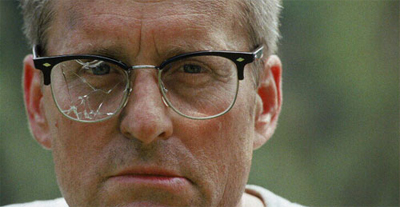

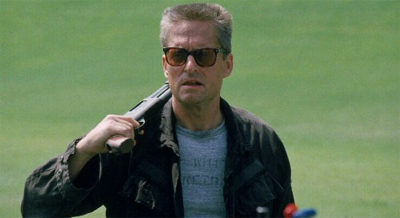
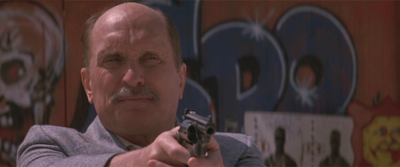

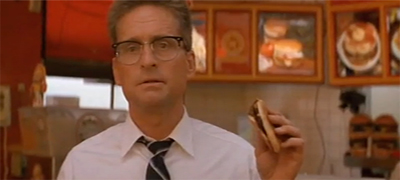
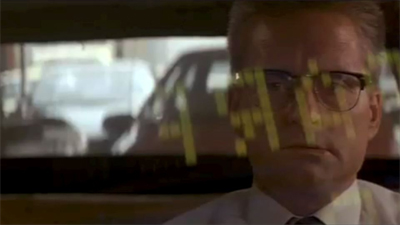





I simply adore this movie and totally agree that Schumacher can make a cracking movie….every once in a while. The soundtrack to this is one of the grails of the film score world. I hope it eventually sees the light of day.
Has the soundtrack not been released? Nuts to that.
https://www.youtube.com/watch?v=vgNKRqOOyE4&list=PLPJGALdCN7jHcOVNA8YRoE4eDABMvhi35 Lucky you, it seems the OST was found and put up on youtube!
“Falling Down” is definitely one of Schumacher’s best films. It’s odd that he alternated between this kind of movie and…well, do I need to name it? This film is a bit (okay, quite a bit) over the top, and subtlety in presenting its themes is nonexistent, but that’s part of its charm.
Yep. It wouldn’t be the same without the absurdist slant. I tend to imagine that we’re seeing a lot of the film (but not all of it) from D-FENS’ point of view. Hence the signs rading “kill” and the impossible situation with the rocket launcher. (I mean, I don’t know about rockets, but that should have hit the bottom of the tunnel, right?) Remove that, and it becomes potentially so grim and pathetic that it’s completely soul-destroying (instead of merely slightly soul-destroying).
In fiction, there’s such a thing as the unreliable narrator, where the story is told first person but is lying to the reader. I wonder if the same concept can be applied to movies, but as seen through the perspective of the protagonist so that what you’re seeing on screen may not be what actually happened in “real life.”
This movie still looks amazing and fresh after all these years.
It does indeed.